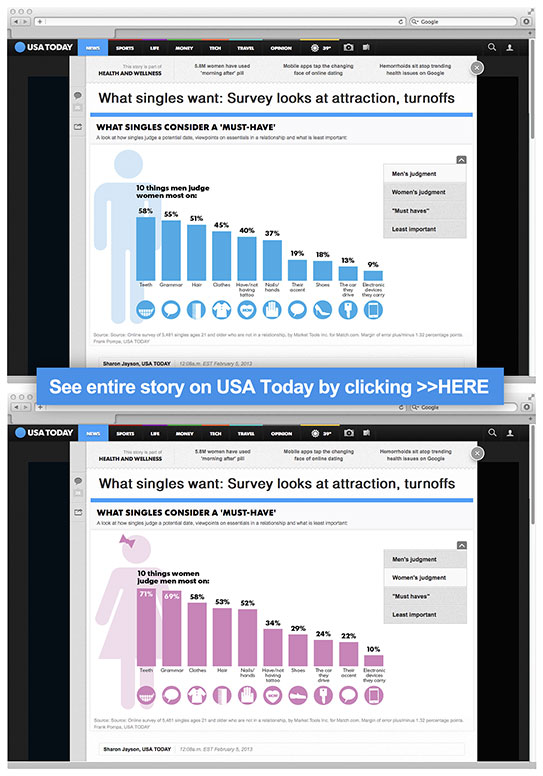 YES, IT’S VALENTINE’S DAY—and what better day to talk about smiles, attraction, and relationships!? It’s probably never occurred to you to look to your dentist for dating advice. But the fact is that smiles have a surprising amount to do with attraction.
YES, IT’S VALENTINE’S DAY—and what better day to talk about smiles, attraction, and relationships!? It’s probably never occurred to you to look to your dentist for dating advice. But the fact is that smiles have a surprising amount to do with attraction.
It’s Not So Much About Makeup And Primping
Women in many countries annually spend up to $8 billion on makeup. And, the average woman in those countries spends 20 minutes a day (or more) applying it. But according to a Wrigley Gum study where participants looked at thousands of photos of women smiling with makeup, smiling without makeup, not smiling with makeup, and not smiling without makeup, the study found that both men AND women think that a smile makes a person more attractive than makeup does (and it may save a woman 20 minutes a day)!
Smiles Literally Draw People Closer
Why are smiles so attractive to us? A smile is a “social cue”. It can signal apology, welcome, gratitude, or celebration. A smile means “you’re clear to approach” and we all react to it subconsciously.
Your Smile Ranks #1 In How You’re Initially Judged
Sometimes it’s unwise to judge a book by its cover, but the importance of a first impression is undeniable. A recent survey of over 5,000 singles found that both men (58%) and women (71%) judge the opposite sex MOST on their teeth.
Unfortunately, this is rough news for the 30% of people who are unhappy with their smiles. If you’re one of them, please contact us to visit about things you can do to be more confident about your smile, whether you’re ready for something big or just looking for a small, subtle improvement.



 HAVE YOU EVER HEARD someone say that after you cut your finger, and it heals, that the scar tissue is stronger than normal tissue? Some opinions vary, but it appears that this notion is more myth than truth. But what about your teeth and your restorative dental work? Can a filling or a crown get a cavity?
HAVE YOU EVER HEARD someone say that after you cut your finger, and it heals, that the scar tissue is stronger than normal tissue? Some opinions vary, but it appears that this notion is more myth than truth. But what about your teeth and your restorative dental work? Can a filling or a crown get a cavity? YOU PROBABLY ALREADY KNOW MANY OF THE DANGERS associated with smoking. But, did you also know that smokers are twice as likely as non-smokers to lose their teeth? In addition, there are even greater dangers that smoking presents to your oral health.
YOU PROBABLY ALREADY KNOW MANY OF THE DANGERS associated with smoking. But, did you also know that smokers are twice as likely as non-smokers to lose their teeth? In addition, there are even greater dangers that smoking presents to your oral health. ARE YOU A LITTLE SURPRISED by the headline of this blog post? If so, you’re not alone. Many people are unaware of the link between asthma and tooth decay resulting from dry mouth.
ARE YOU A LITTLE SURPRISED by the headline of this blog post? If so, you’re not alone. Many people are unaware of the link between asthma and tooth decay resulting from dry mouth. DID YOU REALIZE THAT AN ESTIMATED 90% of systemic diseases can have an oral manifestation? Your mouth is loaded with helpful information about your body’s overall health.
DID YOU REALIZE THAT AN ESTIMATED 90% of systemic diseases can have an oral manifestation? Your mouth is loaded with helpful information about your body’s overall health.
 DOES FREQUENT SNACKING PRESENT PROBLEMS FOR OUR TEETH? Well, it depends. Every time we eat, our mouths go to work cleaning things up and restoring “balance”.
DOES FREQUENT SNACKING PRESENT PROBLEMS FOR OUR TEETH? Well, it depends. Every time we eat, our mouths go to work cleaning things up and restoring “balance”. 
